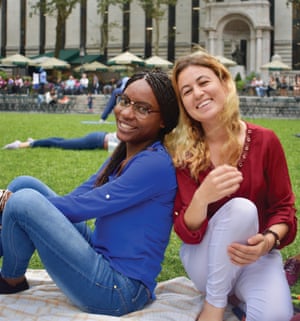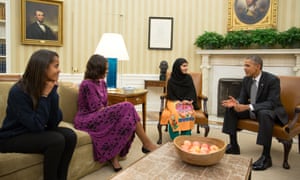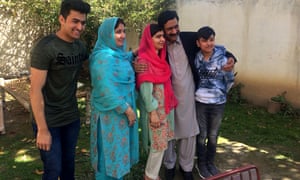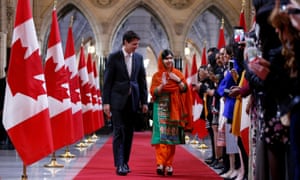Interview
Malala Yousafzai on student life, facing critics – and her political ambitions
How does a 21-year-old Nobel laureate adjust to student life – and what comes next for the world famous activist? Yousafzai explains why she was driven to tell the stories of other displaced girls
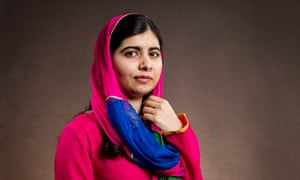
“People have heard my story already,” says Malala Yousafzai, the youngest ever Nobel laureate, in something of an understatement. “I thought it was time for people to listen to other girls’ stories as well.” Her new book, We Are Displaced is a collection of harrowing, heartbreaking and ultimately inspiring first-person accounts of the lives of girls Yousafzai has met in her travels to refugee camps and settlements across the world. “We hear about refugees in the newspapers, on TV, and it is just in numbers, and it’s usually in a negative way. But we do not hear from them, especially when it comes to young women and girls. So I wrote the book.”
Yousafzai’s story – shot by the Taliban in Peshawar in 2012, when she was 15, for speaking out for the rights of girls to go to school – is surely one of the best known in the world today, and was recounted in the international bestseller I Am Malala, written with the journalist Christina Lamb. As she tells it, in the comfort of a discreetly guarded London hotel room, one minute she was on the school bus with her friends talking about the following day’s exams, the next she was “opening my eyes in this hospital in Birmingham and people were speaking in English”. She was deaf in one ear and the left side of her face was badly damaged where the bullet had narrowly missed her eye, but she was lucky to be alive.
After she recovered, rather than retreating into anonymity and GCSEs, she stepped up to a role as a global ambassador for female education. On her 16th birthday in July 2013 she gave an address to the UN, which declared the event “Malala Day”, and she appeared on the cover of that year’s Time magazine’s 100 Most Influential People in the World issue (she was on the list three years running). She has joined the ranks of those so famous they are called only by their first names, and is herself on first-name terms with politicians and celebrities (“Angelina was the highlight”). Not to mention being awarded the Nobel peace prize in 2014. Here was a remarkable story and a young woman the world could celebrate – Malala, a sort of modern-day saint. But, on the dull January morning that we meet, this chatty 21-year-old Oxford undergraduate, in a bright pink headscarf and tunic, seems to have her feet firmly on the ground, albeit in a pair of impressively high heels for 10am. The only external sign of her injuries is a slightly lopsided smile, which she gives often.
If there has been criticism, or cynicism, directed towards Yousafzai (in Pakistan there has been a great deal, even including theories suggesting she faked being shot), it is in the idea that she is in some way a creation – of the west, of her father, the education activist Ziauddin Yousafzai, of the media. Others complain that she has been absorbing too much attention (she was accused on social media, she says in I Am Malala, of having “a teen lust for fame”) when so many young Pakistanis, and children around the world, have suffered. So it is fitting that in her first big project since receiving the Nobel (which she likens to being “in a car, rather than a bike” in terms of the reach of her activism), she uses her name to make known those of others – Zaynab, Muzoon, Najla – who might otherwise have been ignored.
With the US government in shutdown over Donald Trump’s wall, the ongoing “migrant crisis” in Europe and the endless Brexit debates, the issue of immigration is rarely out of the headlines. But, as Yousafzai says, it is all too easy to forget the individual suffering, something that was brought tragically into focus after the body of Syrian toddler Alan Kurdi washed up on the Greek island of Cos in 2015. Yet as migration figures have grown higher, the ugly rhetoric both in the UK and the US has hardened. As Yousafzai points out, “90% of the refugees” are hosted by developing countries. “So we need to realise who is actually carrying the burden.” We Are Displaced, co-written with New York journalist Liz Welch, is intended “as a reminder to the world”.
She began work on it more than five years ago in the Syrian refugee camps in Jordan, which she was visiting as part of her Malala Fund for girls’ education. It was not possible for Yousafzai to meet all of the women in person, such as Ajida, a young mother from Rohingya, but she felt it was important to include the crisis in Myanmar. While we are sadly all too familiar with the humanitarian catastrophes of Syria and Iraq, she wanted to draw attention to the fact “that this is happening literally in every corner of the world. It’s happening in Latin America, it’s happening in south-east Asia, it’s happening in south Asia, it’s happening in most parts of Africa.” She wanted to show “how big and broad this issue is”.
While she says it is hard to single out one story, the ordeal endured by Marie Claire – whose family fled the Democratic Republic of Congo when she was nine, only for her mother to be murdered in front of her by an anti-refugee hate mob in Zambia – is impossible to forget. When she was 16, Marie Claire received news that the visa for which her mother had applied 10 years earlier had finally been accepted: the family were moving to Lancaster, Pennsylvania, “the refugee capital” of the United States. On 16 June 2016, when she was 19, she graduated from high school, the first person in her family ever to do so. “My heart was full and cracked at once,” she writes. “This was my mother’s dream, too. She should have been here to experience it with me.”
In the story of 16-year-old Sabreen, forced to leave Yemen and then Egypt, we learn what it really means to try to cross the Mediterranean in an overcrowded fishing boat, and in the plight of Guatemalan orphan Analisa, held in the detention centres, known as the “ice box” and the “dog pound”, on the Mexican border, the cruelty of Trump’s immigration policy becomes all too real.
“We can’t imagine being in a car and going from Birmingham to London on our own when we are 14 or 15,” Yousafzai says. “Our parents would be worried about us. And these girls walk for days and nights, all on their own, some are getting in buses with strangers, going through all the security things, not knowing if they will be safe or not.” As the book makes clear, even after surviving perilous journeys, girls are too often greeted with hostility (“We were truly being treated like animals” is a common refrain), their futures far from certain. “They are putting their lives at risk and I think this is actual courage and bravery,” says Yousafzai, herself often called “the bravest girl in the world”.
She is keen to stress the distinction between being displaced, forced to move within your own country, and becoming a refugee, hence the book’s title: “I called it ‘displaced’ because the majority of people are internally displaced rather than refugees. In total there are 68.5 million people who are displaced and only around 24 million are refugees. And I myself became displaced in Pakistan, plus 2 million other people.”
In May 2009, several months after the Taliban forbade girls from going to school in Peshawar, Yousafzai’s family left their home in Mingora: it “felt like having my heart ripped out”, she writes. Although they were able to return after three months, their greatest fear was that they “would be displaced for ever”. Even as a 12-year-old, Yousafzai says she knew that the home she was returning to “no longer existed except in my dreams” – a feeling echoed by Maria in the book, who has moved eight times within Colombia, from one makeshift camp to another, but has “never felt ‘at home’ in any other place than the one I keep alive in my head from when I was a child”.
Then, after the shooting in 2012, Yousafzai’s family had to leave their country for ever. “We were plucked from our mountain valley in Swat, Pakistan, and transported to a brick house in Birmingham,” she writes in the preface to I Am Malala. Technically, she explains, they are not refugees, but residents in the UK: “For me it is more than becoming a refugee, it is about displacement, losing your home.”
The “paradox” of the immigrant experience, as the Pennsylvania volunteer who becomes Marie Claire’s “American mom” describes it, is to be “grateful for a new life that is based on the painful loss of an old one”. “Oftentime” Yousafzai observes, in a quaint expression she uses frequently, “we forget about how the refugees also want to go back to their home. Every girl has this dream – they want to see their home, they feel this kind of incompletion in their life.” For her, “home has this sense of belonging. When you become a refugee you feel like you are a stranger to the land, an outsider. But as soon as you feel like you belong you are an insider and you deserve an equal right to it as anyone else. This becomes your home. And you can have many homes.”
With its snow-capped mountains and pine forests, the Swat valley is known as “the Switzerland of the east” – “We think it is better than Switzerland,” she says. While Yousafzai is “very proud of Birmingham”, which she now regards as her second home, she still misses the sounds and smells and tastes of Peshawar: sweet tea boiled on the stove, her mother’s chicken and rice, somehow “tastier” back home, sharing jokes with her friends – “The English sense of humour is different,” she says diplomatically. And she will never get used to the weather (although she ruefully concedes that “summers are getting better, probably because of global warming”) or the fact that drivers don’t honk their horns all the time: before she came to the UK she “had never seen people following traffic rules”.
Of course it is not just Malala, but her parents and younger brothers Atal and Khushal who have been uprooted. It has been particularly difficult for her mother, Toor Peksi, whose homesickness was “horrible” at first. It is getting better, Yousafzai says. “She is happier”, and has made friends with her English teacher, with whom she enjoys a cup of tea. For her mother, getting the lift to the ninth floor of their first Birmingham flat was as terrifying “as boarding a space ship”; she was bothered by the nightclubs on the street where they lived and the fact that the girls didn’t seem to wear many clothes, even in winter. “It didn’t make sense to her – it’s snowing and these girls are not covering their legs. My mum used to say, ‘I wish I had the same legs as them’,” she laughs.
Yousafzai was lonely at school, the unfamiliar woolly tights not the only thing making her uncomfortable: “I used to just look at everybody who was talking and laughing and think, should I go and talk to them or not, should I join their gossip or not? Sometimes I thought, OK, I should just go to the library and read a book.” On the day her Nobel was announced she was in a chemistry lesson. The deputy head teacher called her out of the class to tell her she had won. Then she went back to her desk.
Last March the family made their first trip back to Pakistan since the shooting, her father always worried that elections or other political events would make it dangerous. “I realised we would never find the right time, there’s always something happening,” she says. “So it is just better to go now. I was quite stubborn.” They met hundreds of their extended family and friends – “lots of selfies and lots of hugs and prayers and kisses” – including her childhood best friend and academic rival Moniba, who is now studying medicine. They visited Swat, “the weather was nice”, and returned to their old home, where the family who now live there have kept her room just as it was: “my school trophies and drawings and books and cupboard and bed and everything. It was such a beautiful time.”
Now she is in her second year studying philosophy, politics and economics at Oxford, something she dreamed of back in Pakistan as a child. She is at Lady Margaret Hall, founded as one of the first female colleges, where her hero Benazir Bhutto, the former Pakistani prime minister who was assassinated in 2007, also studied PPE. She is having fun and “just living a bit of normal life”. Is that possible? “In Oxford there are a few famous people already there, so we don’t feel very famous,” she says (she’s too diplomatic to name names). She has made good friends: “They don’t treat me as ‘the Malala’, but just their friend Malala.” She was given a hard time after someone posted a photo of her wearing a pair of skinny jeans online but, “It’s just jeans, what’s wrong with jeans?” she asks breezily, “I just don’t care about those things.”
Does she never suffer from self-doubt or anxiety? “It depends what we are talking about,” she says. “It is a challenge for girls to believe in themselves and to believe that they can do anything, oftentime they become a hurdle to themselves. There are external challenges, but there are also internal challenges, we give up at the external ones and we say, ‘OK fine, maybe I’m not capable of becoming a scientist or prime minister or an astronaut or something.’ I think it is important that at first girls develop that confidence in themselves and then together we will fight the external challenges.”
She was “surprised” to discover that sexism can still be found in the UK. “We consider the west as the perfect world where there is equality and democracy,” she says. “When you talk about the so-called developing countries, the issues are more visible and people talk about them openly. But in the west this is something that is happening, but is often not talked about.” The fact that women are speaking out about sexual harassment with the #MeToo movement, and against the gender pay gap, sends a message to “women working in Pakistan or India or Brazil. It is empowering for everyone to see that women in the west are also joining them.”
Does she still want to become the next prime minister of Pakistan? “I was very little!” she says, in the way of someone who is often asked the same thing (anyone who has watched the 2009 New York Times documentary Class Dismissed can’t help but wonder if perhaps this preternaturally articulate child might one day fulfil her ambition). And PPE students do have a habit of going on to run the world. “People always focus on the politics. It’s also philosophy and it’s also economics,” she reminds me. No, she doesn’t have any plans or interest in politics, right now, she says. But who knows in 15 or 20 years?
She feels she can make more of a difference through the Malala Fund, which she wants to “make even bigger”, setting her sights on more than 1 million girls, most of them refugees or displaced, who are out of school.
Like a true politician, she will not be drawn on which of the prime ministers or presidents that she has met, from Gordon Brown to Barack Obama, has most impressed her. “It’s not that I don’t like them or anything. But it is politics and you do not agree with everything they say.” She is currently reading Michelle Obama’s memoir Becoming. And though she hasn’t met Trump, she hopes he will read her book. “It’s an easy read,” she shoots back, when I point out he’s not a big reader. “He could tweet it,” she laughs. More seriously, she says she would invite him to visit a refugee camp. “I could help him to organise that.”
On the day we meet, she is taking part in a GuardianLive event at the Barbican in London. All her family are gathered in the green room – her teenage brothers presiding over snacks and pastries. The event has sold out, yet still feels lively and intimate, with teachers and friends from Oxford in the audience. When the chair asks if Yousafzai ever felt too afraid to speak out, she replies that she was more scared about what would happen if nobody did. But she does admit to being frightened of animals: “I hope things will be better one day,” she jokes, and she brings the house down with her best Brummie accent. Questions from the floor come from fans, girls and boys, one as young as nine. At the end she gets a standing ovation.
“Sometimes we think about refugees as the victims,” she tells me. “That they must have sad stories, and they are sad indeed, but they also show us how much courage they have and how brave they are.” Despite the horrors, We Are Displaced is also hopeful: many of the girls featured are now studying for degrees. “These young girls are activists. They have dreams for their futures.” As she says, “If one girl with an education can change the world, what can 130 million do?”

